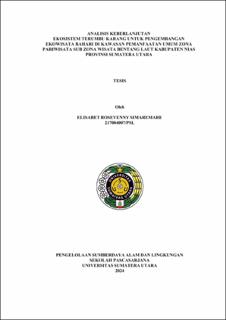| dc.description.abstract | Nias Regency is one of the regions within North Sumatra Province, located to the west of Sumatra Island, approximately 86 nautical miles from Central Tapanuli Regency. Nias has various natural resources that serve as tourism attractions, one of which is coral reef ecotourism. The massive Sumatra earthquake in late 2004 caused significant changes in the seabed across the coastal areas and islands of Nias. This tectonic earthquake resulted in land uplift, leading to the shallowing of the seabed, which significantly affected the ecological conditions of the marine ecosystem, particularly the coral reef ecosystems. The research was conducted from December 2022 to June 2023. The method used was an ecological approach, analyzing coral cover, coral juveniles, and reef fish using the Rapfish method. The suitability analysis of coral reef ecotourism observed activities such as snorkeling, diving, and the tourism suitability index, along with the measurement of water quality parameters. The research results showed that the coral cover condition was 31.54%, categorized as moderate, with a coral juvenile abundance of 7.6 colonies/m², and an average fish abundance of 221 individuals/350 m². The Tourism Suitability Index (TSI) for snorkeling and diving was not within the suitable range, with values of 1.14-1.58 and 1.10-1.59, respectively. The sustainability status of the coral reef ecosystem for marine ecotourism development at the research location was classified as moderately sustainable, with an index value of 51.85, focusing on three dimensions: ecology, socio-economics, and institutional and technological aspects. Management strategies that can be implemented include coral reef rehabilitation to support sustainable marine ecotourism development, emphasizing educational tourism centered on coral reef conservation. Furthermore, it is essential to develop a structured and organized coral reef management plan, supported by adequate and sustainable funding sources, and to implement policies involving the active participation of government in serious and sustained management of the area. | en_US |


